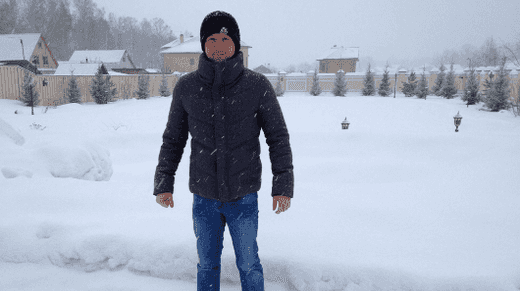Why You Must Fail In Order To Succeed Learning A Language
 Written byDonovan NagelDonovan NagelTeacher, translator, polyglot🎓 B.A., Theology, Australian College of Theology, NSW🎓 M.A., Applied Linguistics, University of New England, NSW
Written byDonovan NagelDonovan NagelTeacher, translator, polyglot🎓 B.A., Theology, Australian College of Theology, NSW🎓 M.A., Applied Linguistics, University of New England, NSW
Applied Linguistics graduate, teacher and translator. Founder of The Mezzofanti Guild and Talk In Arabic.- Read time3 mins
- Comments6

Привет from freezing (currently -23 °c) Tatarstan! 🙂
I’ve now been in Russia for just over a week and so far it’s been a great move coming here.
As an Aussie from the coast of sunny Queensland where I pretty much only wear shorts and t-shirts in Winter, this land-locked, frozen city is taking a bit of getting used to but I’m loving it!
Because of my demanding schedule here, I haven’t seen too much of the region yet but I’m lucky to have lots of doors opening up to meet new people already – all of whom don’t speak English. Even though I’ve only been studying Russian for a week and a half so far, the amount of conversation practise I’ve had with native speakers has already been far more than I had in my first month in Korea.
I’m in a region of Russia called Tatarstan where the native language of the area is closely related to Turkish and still spoken by many people at home (and taught in schools) though Russian is the dominant language. As interested as I am in the Tatar language, I’m focusing entirely on Russian for the time being.
If I’m still here in Summer I’ll be heading up to the Kola Peninsular to spend time with the Saami people where I’ll hopefully have enough Russian to use as a bridge to learn some of one of the local languages up there too which has been on my to-do list for many years.
Failing is not the same as being a failure
I had a real “here we go again” moment when I stepped off the plane here last week.
I’ve become so used to moving to new places where I don’t understand the local language that I mentally prepare myself for the many failures I know I’m about to put myself through.
Those of you who have moved to a foreign country to learn another language know how challenging and exhausting it can be.
In the past week I’ve made a lot of potentially embarrassing public mistakes that a few years ago would have demotivated me a lot (e.g. getting asked questions in the supermarket and at the gym with loads of people standing around and not being able to understand or answer while everyone’s staring and making snide remarks).
It can be pretty intimidating being in those situations (especially in Russia where people come across as much more abrupt than in a place like Korea) but these days I just accept that it’s part of the journey, smile and count it as a necessary bump in the road. 🙂
Failures and mistakes are indicators that you’re on the right track.
If you’re not making mistakes and failing then it means you’re not challenging yourself hard enough – you’re doing what’s comfortable and easy rather than pushing your boundaries.
One piece of advice I can’t stress the importance of enough is to embrace failures. Failing is not the same as being a failure (unless you give up)!
Here’s a video I put together on my first day here. Make sure to subscribe to my YouTube channel if you haven’t already.
Dealing with bad days in language learning
Bad days in language learning (failure) can cripple our confidence and worsen anxiety, causing us to give up momentarily and sometimes even entirely.
And we all have them.
I had a frustrating moment in Korea when I was learning Korean that initially caused me serious discouragement, but by changing my perspective I was able to look at it as something positive and as an opportunity for growth.
I recorded a video recounting my experience here:
Have you experienced bad failures that almost caused you to give up learning a language?
Share your experience below.
🎓 Cite article
 Grab the link to this article
Grab the link to this article
Let me help you learn a language
JOIN THE GUILD:

Donovan Nagel - B. Th, MA AppLing
I'm an Applied Linguistics graduate, teacher and translator with a passion for language learning (especially Arabic).

















 Arabic Resources
Arabic Resources Spanish Resources
Spanish Resources French Resources
French Resources Italian Resources
Italian Resources German Resources
German Resources Mandarin Chinese Resources
Mandarin Chinese Resources Hindi Resources
Hindi Resources Portuguese Resources
Portuguese Resources Korean Resources
Korean Resources Japanese Resources
Japanese Resources Russian Resources
Russian Resources








6 COMMENTS
NO ADVERTISING. Links will be automatically flagged for moderation.
Mohamed Ahmed
Good luck to you Donovan, I am really interested in learning Russian, started watching video lessons of “Russian World”, that is a free video course available on youtube. I hope that would help you or help your readers who are learning Russian. I was looking for free books (pdf) for learning Russian, Can you help?
P.S. I am from Egypt, so I say to you حظًا موفقًا في تعلم الروسية :)
Scott
The private live in tutor gig sounds pretty cool. How do you find such jobs? How do you think your English teaching feeds into language learning and vice versa. What insights have you gleaned from one are that helps you in others?
Donovan Nagel
I was quite lucky to find this one actually. I work for one of the wealthiest women in Russia. Like all teaching gigs it was advertised online. My only concern with this is that they travel a lot which means there’ll be quite a bit of time spent outside of Russia later in the year (Dubai and Turkey mainly I think). If this happens I might have to look at other options because I want to keep up my Russian immersion but I don’t really think I’ll find a salary this incredible anywhere else so we’ll see.
Teaching definitely helps me learn. Raises my awareness of many learner issues - especially L1 transfer (i.e. how Russian, Korean, etc. interfere with English). It’s great teaching the 3 year old of this current family because his Russian is still baby Russian in a sense so I’m able to learn a lot by interacting with him.
Robert
Hey Donovan, good reminder about the necessity to set your expectations properly. If you know you’re going to run into these problems when you start, you’ll be better prepared to deal with them.
Sounds like you have a good little set up where you are...it will be interesting to see how you progress.
Mary Jane Burton
I think you did great, but may have been socially embarrassed. Whatever, as you say, you got your point across, and that’s the main thing. You get tons of points for having the guys to go in there in the first place!
Aaron Posehn
Next time you go to the dentist, you’ll now be fully equipped! Great job!